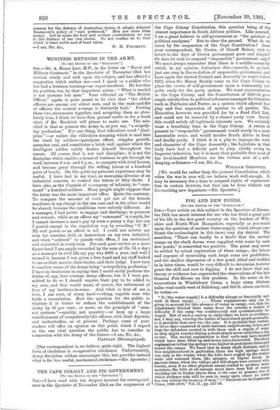'BUSINESS METHODS IN THE ARMY.
rr0 THE EDITOR OP TEE "SPECTATOR."] SIR,—Mr. A. Boner Law, M.P., in his letter on " Naval and Military Contracts " in the Spectator of November 23rd has written wisely and well upon the subject, and has offered a suggestion which strikes me—and I speak as a soldier who has had a business training—as super-excellent. He fortifies his position, too, by that important axiom : " What is needed is not systems but men." Your editorial on " The British Officer," again, is quite sound in its view that " the ablest officers are among our ablest men, and in the rank-and-file of officers the mental average is distinctly high." Putting these two statements together, and accepting them as abso- lutely true, I think we have firm ground under us for a fresh start, if Mr. Brodrick will please to make one. The mis- chief is that at present the Army is, as you say, "a stupefy- ing profession." For one thing, that ridiculous word " disci- pline "—or rather the ridiculous meaning which is read into the word by soldiers—paralyses effort, cripples growth, quenches zeal, and constitutes a brick wall against which the intelligent soldier vainly dashes himself throughout his career. Of course that is not real discipline ; it is not the discipline which enables a house of business to get through its work between 9 a.m. and 6 p.m., to compete with rival houses, and become great through the willing labour of a hundred pairs of bands. On this point my personal experience may be usefuL I have had in my time, as managing-director of an industrial concern, to control the labour of fifty clerks. I have also, as the Captain of a company of infantry, to " com- mand" a hundred soldiers. Many people might suppose that the latter was the more important office. Quite the contrary. To compare the amount of work got out of the human machines in my charge in the one case and in the other would be absurd, because the conditions were entirely different. As a manager, I had power to engage and discharge, to promote and reward ; while as an officer nay " command " is a myth, for I cannot increase a man's pay by even a penny a day, nor can I punish except in the regulation way by awarding " C. B." My real power as an officer is nil. I could not muster my men for exercise, drill, or instruction on my own initiative, and when " ordered " to parade with tiem, I am restrained and restricted at every turn. For such poor service as a mere figure-head I am amply rewarded by the sum of lls. 7d. a day ; as a manager in civil life my pay was £600 a year, and well I earned it, because I was given a free hand and my staff looked to me as their master, their leader, and their judge. I now turn to another cause of the Army being " a stupefying profession." I have no hesitation in saying that I could easily perform the duties of, say, four average Army officers, but if I were per- mitted to do so I should require their pay to be added to my own, and that would mean, of course, the retirement of four of my brothers-in-arms. And what is true of me is true, I am sure, of every hard-working, capable man who holds a commission. Now the question for the public is whether it is better to reduce the establishment of the Ar;xty by 50 per cent., or more, on the principle of " men, not systems "—quality, not quantity—or keep up a large establishment of compulsorily idle officers, with their deputies and understudies, as at present. Perhaps some of your readers will offer an opinion on this point, which I regard as the one vital question the public has to consider in connection with the Army of the future.—I am, Sir, &c., CAPTAIN (Re-employed).
[Our correspondent is, we believe, quite right. The highest form of obedience is co-operative obedience. Unfortunately, Army discipline seldom encourages this, but provides instead what is far less useful, mechanical obedience.—En. Spectator.]














































 Previous page
Previous page